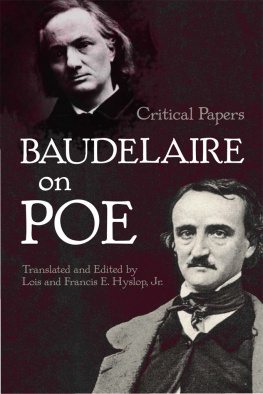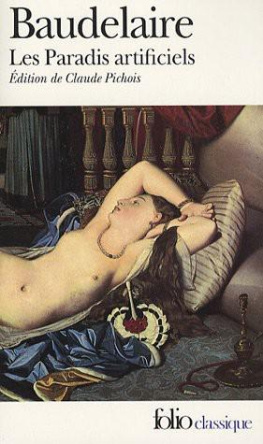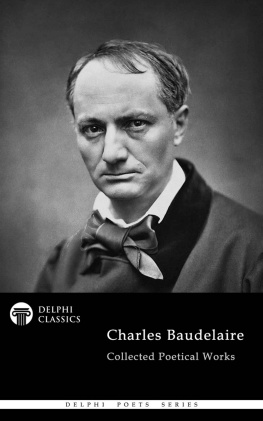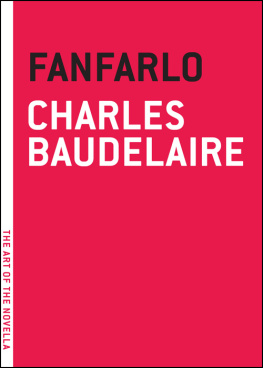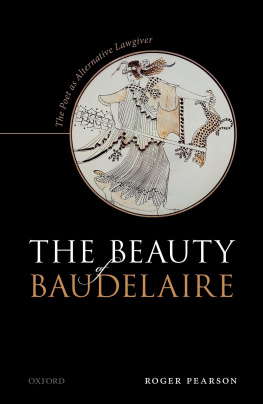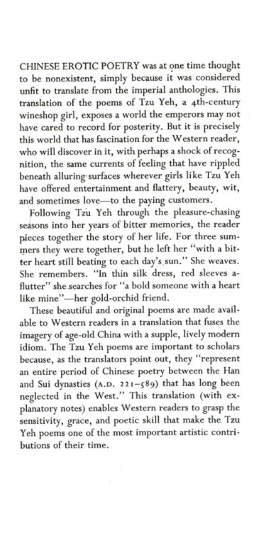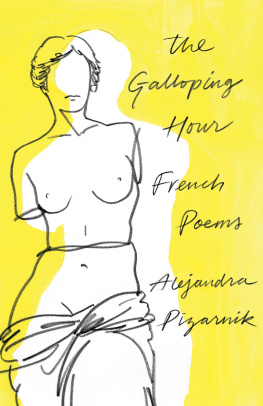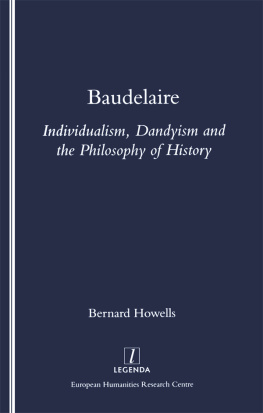
BAUDELAIRE: SELECTED POEMS
CHARLES - PIERRE BAUDELAIRE was born in Paris in 1821, the only son of an elderly father and young mother. His father died before he was six and his mother remarried a year later. Baudelaire was later to express violent hostility towards his stepfather, Colonel (subsequently General) Aupick.
Wayward at school, he came second in the national Latin verse competition in 1837, but was still expelled from Lyce Louis-le-Grand in 1839. A nominal law student, he fell into bohemian company and his alarmed parents sent him on a long sea voyage to the Indian Ocean. He returned prematurely and was never to travel far from Paris again until his ill-fated journey to Belgium at the end of his life. On his majority in 1842 he moved to a flat on the Ile St-Louis and indulged his artistic tastes so extravagantly that his parents, trying to safeguard what was left of his capital, transferred control of it to the lawyer Ancelle, a well-meaning soul on whom Baudelaire would always vent his resentment at this humiliating situation.
Baudelaire was never again to be free from debt, or from schemes to restore his fortune by writing, publishing or lecturing. He suffered a stroke in Belgium in 1866, lingered on semi-paralysed and, latterly, mute and was brought back to Paris, where he died the following year. His collection of verse, Les Fleurs du Mal (1857) was the subject of a prosecution for indecency; six poems were removed from it and not reinstated in France until 1942. Further editions, with more poems, appeared in 1861 and 1868. His prose poems and writings on art and literature were collected after his death; the literary criticism shows the influence of Edgar Allan Poe, whose short stories he also translated.
Baudelaire is known to have had attachments to three women, the longest-lasting to the creole Jeanne Duval. So far as we know he died childless.
Carol Clark is Fellow and Tutor in French at Balliol College, Oxford.
CHARLES BAUDELAIRE
Selected Poems
With a Plain Prose Translation, Introduction and Notes by
CAROL CLARK
PENGUIN BOOKS
PENGUIN BOOKS
Published by the Penguin Group
Penguin Books Ltd, 80 Strand London WC2R 0RL , England
Penguin Putnam Inc., 375 Hudson Street, New York, New York 10014, USA
Penguin Books Australia Ltd, 250 Camberwell Road, Camberwell, Victoria 3124, Australia
Penguin Books Canada Ltd, 10 Alcorn Avenue, Toronto, Ontario, Canada M4V 3B2
Penguin Books India (P) Ltd, 11 Community Centre, Panchsheel Park, New Delhi 110 017, India
Penguin Books (NZ) Ltd, Cnr Rosedale and Airborne Roads, Albany, Auckland, New Zealand
Penguin Books (South Africa) (Pty) Ltd, 24 Sturdee Avenue, Rosebank 2196, South Africa
Penguin Books Ltd, Registered Offices: 80 Strand, London WC2R 0RL , England
www.penguin.com
Translation, introduction and notes copyright Carol Clark, 1995
Chronology copyright Carol Clark, 2004
All rights reserved
The moral right of the editor has been asserted
Except in the United States of America, this book is sold subject to the condition that it shall not, by way of trade or otherwise, be lent, re-sold, hired out, or otherwise circulated without the publishers prior consent in any form of binding or cover other than that in which it is published and without a similar condition including this condition being imposed on the subsequent purchaser
ISBN: 9781101493649
INTRODUCTION
When the first volume of Baudelaires complete works was published the year after his death, a copy was sent to Prosper Mrime, a man of taste, a power in the world of art and scholarship, and a considerable writer himself. He wrote to a friend, Theyve sent me Baudelaires works, which have infuriated me. Baudelaire was mad! He died in the poorhouse after writing some verses that won praise from Victor Hugo, and which had nothing else to recommend them but their indecency. Now theyre calling him an unrecognized genius!
Victor Hugos name is mentioned in most of the judgements of Baudelaire made soon after his death, and this is to be expected, for Hugo was then, and for long afterwards, regarded as Frances greatest poet of the nineteenth century. He was a man of boundless physical and poetic energy: in his eighty-three years of life he published poems, plays, novels and political writings, which in the standard collected edition fill thirty quarto volumes. He also played a significant part in the political upheavals of the century, in turn as an ultra-Royalist, a supporter of constitutional monarchy and a Republican; he was created a pair de France in 1845 and, on his return to Paris in 1870, elected to the Assemble Nationale. On his death he was voted a national funeral; after lying in state under the Arc de Triomphe his body, at his own wish, was borne across Paris in a paupers hearse amid grieving crowds estimated at two million, before being laid to rest among Frances greatest citizens in the Panthon.
Baudelaires life and death could hardly have been more different. Apart from a handful of juvenilia and late pieces, his whole output of verse is contained in one volume, Les Fleurs du Mal, which, though it gained a certain notoriety in his lifetime and was admired by the most advanced writers of the day, had little public success. (He was known to the wider public, if at all, as the translator of Poes tales.) He also wrote a slim volume of prose poems, a long-short story (La Fanfarlo), a set of essays on the effects of various drugs (Les Paradis artificiels), part of which was a free translation of De Quincey, and a body of art, music and literary criticism which was never collected in his lifetime but now appears as the Curiosits esthtiques and LArt romantique. His attempts to win fame and fortune by his writings were always perfectly unsuccessful; his candidature for the French Academy was regarded as absurd, and in 1865 he estimated that twenty-odd years of writing and publishing had brought him little more than fifteen thousand francs about 600 in the money of the day. Unlike, say, Flaubert, he did not have a reliable private income and spent most of his adult life in the peculiarly painful poverty of the dclass. After a brief flirtation with revolutionary action in 1848 he avoided political involvement of any kind. His health declined sharply from 1864 until his death in 1867, at forty-six (not in the poorhouse but in a private clinic paid for by his friends). He was never mad, in the sense of psychotic, but his behaviour and reasoning were often regarded as strange even by those who loved him, and have given rise to a copious interpretative literature after his death, ranging from the Freudian to the existentialist. For the last year of his life, after several strokes and probably affected by tertiary syphilis, he could not speak, though his friends maintained that his mind was not affected.
He had the final misfortune, for a Parisian, of dying in August, and the most distinguished guests invited to his funeral did not attend. He was hurried to his grave in a summer downpour, attended only by a small group of friends which included Manet and Verlaine. When his fellow poet Thodore de Banville, speaking his funeral oration, said that in the near future Baudelaire would be recognized as a poet not only of talent but of genius, and that he would haunt the minds of modern men and move them when other artists left them cold, many hearers must have dismissed these words as fanciful, an understandable emotional response to the loss of a beloved friend.
However, Banvilles prediction has come true. French readers now have a choice of half a dozen paperback editions of
Next page

